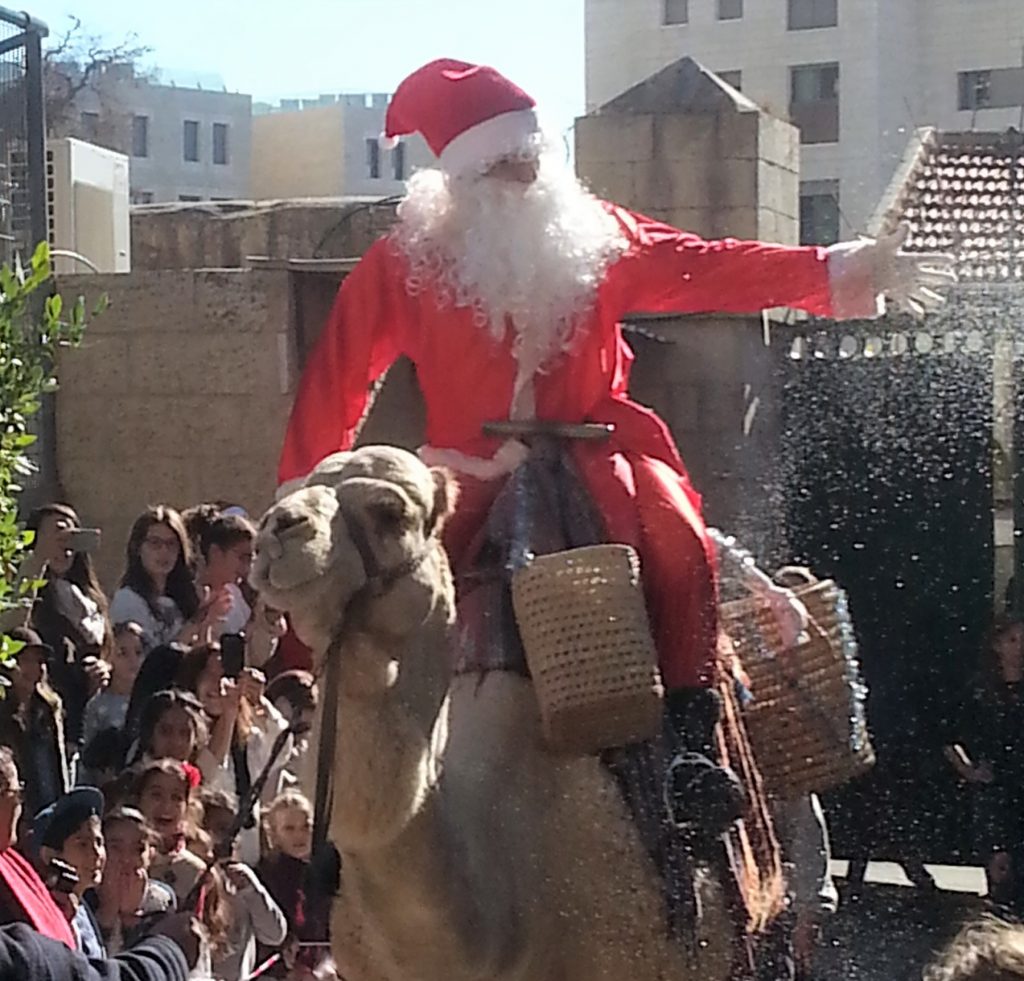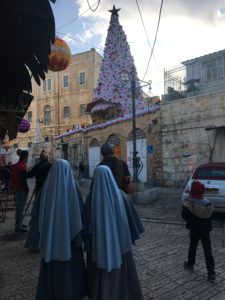When Muslims make merry at Christmas
By Khaled Diab
For Western Muslims, Christmas is just outside their doorsteps. For some, Christmas even skips merrily in from the cold and crosses the threshold into their homes.

Photo: ©Khaled Diab
Monday 6 January 2020
Here in Belgium, people do not traditionally set up their Christmas trees until after the chocolatey feast of Saint Nicholas or Sinterklaas, which mutated to form the American “Santa Claus” in the melting pot of New York, formerly known as New Amsterdam.
Not being one to stand on ceremony, my wife, who is Belgian, suggested we put out the Christmas decorations early this year to help ease the blues of our first full winter back in Europe after several years in Tunis and Jerusalem.
When the saintly gift-bearer, whose existence my 10-year-old son is beginning to doubt, arrived for what might be his final visit to our house, he must have been confused to find it all done up like a Christmas tree already. On deeper reflection, I am aware of the glaring contradiction between parents telling their kids never to accept anything from strangers and then pretending it's okay for a mysterious old man to enter their homes in the dead of night to leave treats behind.
In our multicultural, irreligious household where we encourage our son to celebrate his dual European-Arab heritage, Christmas is his favorite festival, as it is my wife's. With how secularised it has become in the West, it is more fun than the Islamic feasts we also mark, even though those also feature quite a number of secular delights.
When we lived in the Middle East, visits home for Christmas gave our son a warped view of Belgium, making it appear like a magical fairy tale land full of glittering lights and toys. Even for us as adults, these artificial Northern Hemisphere lights and the festive bustle on the streets help warm up the dark, cold winter's nights. And it is dispiriting when they disappear shortly after the new year, plunging the second half of winter into unfiltered darkness.
As an atheistic adult, Christmas has become an integral part of my calendar. Typically, we spend Christmas Eve with my wife's family; Christmas Day is often reserved for friends, not just Christian, but also Muslim and sometimes Jewish.
When I was a child, my Muslim family didn't really celebrate Christmas, but it was all around, right outside our doorstep. I recall the thrill of touring central London with my parents to admire the beautiful lights.
Not wishing us to feel left out, my late mother allowed us to keep some Christmas traditions. We sent and received Christmas cards. Mum bought presents for our teachers and took us to Christmas fetes. We took part in the school Christmas play, and I sang in the school choir for a brief window before my voice broke. I still know by heart many Christmas carols and hymns.
Some years, Christmas even skipped merrily in from the cold outside and crossed the threshold into our home: We decorated the house, and mum attempted to make what were for us exotic Christmas dishes, albeit halal versions, with absolutely no booze in sight.
These days, with commentators declaring that Islam and Christianity are locked in a clash of civilizations, these anecdotes may seem strange or exceptional. They aren't.
Although Christmas is not an Islamic festival, my mum believed in civility and saw it as a common courtesy to share people's moments of joy and grief. Open-minded Muslim that she was, my mother saw no contradiction between celebrating the birth of Christ with our Christian neighbours and her own deeply held faith. After all, Jesus is an important figure in Islam — he is the most holy man next to Muhammad.
Of course, not all Muslims are as accepting of others as my mother was. The reverence with which Jesus is viewed in Islam makes the declarations by some Salafi imams — especially in hardline countries like Saudi Arabia — that Christmas is “haram” and pious Muslims must cold-shoulder their Christian neighbours and colleagues sound like petty, vindictive, intolerant sectarian humbug.
The main beef Muslim critics have is with the Christian conviction that Jesus is the “Son of God,” which they claim is tantamount to idol worship. But even if you disagree on the nature of Christ, there is no reason, beyond spite and insecurity, not to wish Christians a joyous Christmas.
And on closer inspection, the differences in the Islamic and Christian perception of Christ can, to the eyes of the sceptic, appear to be just another chapter in the centuries-long, hair-splitting tradition of Christology.
In fact, as I show in my book, Islam for the Politically Incorrect, the Quran's conception of Christ would sound hauntingly familiar to a Christian, an observation that is bound to enrage these myopic clerics.
Not only was Jesus born a “boy most pure,” according to the Quran, he is also the only character in Islam's sacred book who is described as the “Word” of God. The Quran even quotes God as claiming that “We blew into [Mary] of Our Spirit.” Here we have all three sides of the holy Trinity (the ‘Father', the ‘Son' and the ‘Holy Spirit'), not to mention Mother Mary, but they are perceived to intersect differently in the minds of Muslims.
This central importance of Jesus in both the Christian and Islamic traditions helps explain why the annual media controversies over the “War on Christmas” leave many Western Muslims miffed. For example, while I understand the urge for inclusiveness that motivated the mayor of Charleston, Amy Goodwin, to rechristen the Christmas Parade the “Winter Parade”, it was wholly unnecessary.
How inclusive a festival is depends on how it is conducted, not what it is called. When we lived in Tunis, my son's school held a Christmas party even though the majority of the kids were Muslim, as was Father Christmas himself, and everybody seemed to enjoy it.
At the school before that, in Jerusalem, Santa's arrival on camelback was greeted with the same level of thrill and enthusiasm by Christian, Muslim and Jewish children alike. In Jerusalem, we also enjoyed marking the Jewish festival of Hanukkah, which often overlaps with Christmas.

Image: © Katleen Maes
Just down the road in Bethlehem, the town in which Jesus was reportedly born in a manger (of which a chunk supposedly survives), Christmas continues to be a big deal, especially on Manger Square and the Church of the Nativity. Although Bethlehem is still home to many Christians, there has been a long and steady decline of the Palestinian and Israeli Christian populations, which was around 10% a century ago and stands at less than 2% today.
Christmas lasts a very long time in the Holy Land. There, you get a month of Christmases: Western (25 December), Eastern and Orthodox (7 January) and Jerusalem Armenians (19 January). In a sort of quantum metaphysics, Western and Eastern Christmas are on the same day and they are not (7 January in the Gregorian calendar is 25 Decweber in the Julian calendar still used by Orthodox churches).
Christmas has retained much of its religious flavour for Middle Eastern Christians. For example, midnight Christmas mass at the Church of the Nativity in Bethlehem is so popular, even amongst some Muslims, that tickets are acquired via a lottery.
Here in Belgium and in most of Western Europe, Christmas has become a far more secular affair, effectively morphing into a winter festival for the majority non-church-going population, which is what it originally was prior to the arrival of Christianity. Despite my aversion to the runaway consumerism of the season, it is this merry, jolly, secularised festival that suits my unbelieving heart the most.
____
This article was first published by The Washington Post on 23 December 2019.

